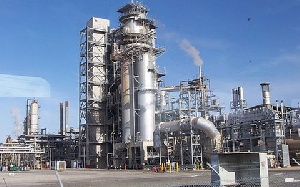- Home - News
- TWI News | TV
- Polls
- Year In Review
- News Archive
- Crime & Punishment
- Politics
- Regional
- Editorial
- Health
- Ghanaians Abroad
- Tabloid
- Africa
- Religion
- Election 2020
- Coronavirus
- News Videos | TV
- Photo Archives
- News Headlines
- Press Release
General News of Friday, 15 August 2014
Source: The Chronicle
Cabal sends TOR to sleep
THOUGH THE Tema Oil Refinery (TOR) is a strategic state asset, which, if well managed, could help to stabilise the economy, cabals operating within and outside the company would simply not allow it to achieve its full economic potential.
To rub salt into injury, the Bulk Distribution Companies (BDCs) have also joined the fray, by taking over the assets of the struggling company, thus sending it into the abyss. Investigations The Chronicle is conducting at the refinery have revealed that the government, in the late 1990s, contracted a $270 million loan from South Korea to build the Residual Fluid Catalytic Cracker (RFCC) processing plant, and under the agreement, Ghana was expected to pay off the loan in ten years.
However, TOR managed to offset that loan in six years, from its Internally Generated Funds (IGF). The Chronicle established that during the same period of paying the debt, the refinery engaged in a number of capital venture projects, which included a Black Oil Tank with a capacity of 40,000 metric tonnes, Aviation Turbine Kerosene (ATK) Tank Number 69, with a capacity of 24,750 metric tonnes, and two crude oil storage tanks, numbers 70 and 71, holding 75,000 metric tonnes.
Other facilities are multi-purpose tanks with a capacity of 13,424 metric tonnes, another tank described as Number 73, holding a volume of 38,794 metric tonnes, and tag number 74, being the biggest with 38,794 metric tonnes. As though that is not enough, TOR, within the same period of paying the loan through its Internally Generated Funds (IGF), constructed Liquefied Petroleum Gas (LPG) tanks 117, 118 and 119.
TOR also bought and installed 2 new 70 tonnes boilers, a 5 megawatts capacity power generating plant and a cooling tower. Also, during the period under review, all the roads at the refinery were awarded on contract to the Engineers Regiment of the Ghana Armed Forces. The importance of TOR, The Chronicle discovered, could be segmented into 2, and they are; National Security and Economic.
National Security A source at the local union of the Trades Union Congress (TUC) lamented on the present predicament of TOR, which is not refining, but rather storing imported products for the Bulk Distribution Companies (BDCs). He noted that the BDCs seemed to have formed a cartel to work against TOR, hence its current predicament, and that the National Security Secretariat should do something about it.
The Law The Bulk Distribution Company’s (BDCs) function was established under the National Petroleum Authority (NPA) Act 691 (2005) to encourage local participation and investment in the oil downstream sector, in line with a government policy set in the late 1990s to deregulate the petroleum industry.
Deregulation became a pillar of the government in the quest to remove major fiscal constraints from its budget. In pursuance of this, the BDCs were expected to: 1: Import, store, and distribute refined petroleum products; 2: Bulk sale (wholesale) petroleum products to Oil Marketing Companies (e.g. Shell, Goil, etc.) from Ghanaian refineries and licensed petroleum importers, and 3; Invest in supply chain infrastructure to augment existing investments by the government – (tank farms, CBM/SPM, etc.)
A number of BDCs have so far established their presence in the country. They are, Alfapetro, Blue Ocean Investment, Chase Petroleum, Cirrus Oil, Deen Petroleum, Dome Energy Resources, Dominion International, Ebony Oil & Gas, Eco Petroleum, Fueltrade, Hask Oil, Maranatha Oil, Oil Channel, Peace Petroleum, Petroleum Warehouse, Redfins Energy, Springfield Energy, Vihama Energy, Misyl Energy, Oiltrade, XF Petroleum, Firm Energy and Juwel Energy.
A member of the local TOR workers union, who wants to remain anonymous, wondered how the security agencies would operate to maintain law and order if these BDCs, most of which have a foreign shareholding structure, decide not to import fuel for two weeks.
Economic He alleged that the activities of the BDCs were reasons why the national currency, the Cedi, has nose-dived, and stated that the companies undertake huge importations in US dollars, which is a cycle that continues unabated.
He added that vessels of finished products, costing between $60 and 70 million each, are berthed at the Tema Port at least two times a week, and one can imagine the amount of cedis that go to chase the US dollar, since the products sold on the Ghanaian market are quoted in cedis. Most of these setbacks, he noted, could have been averted if TOR was allowed to operate at its full capacity, but the cabal would simply not allow that.











